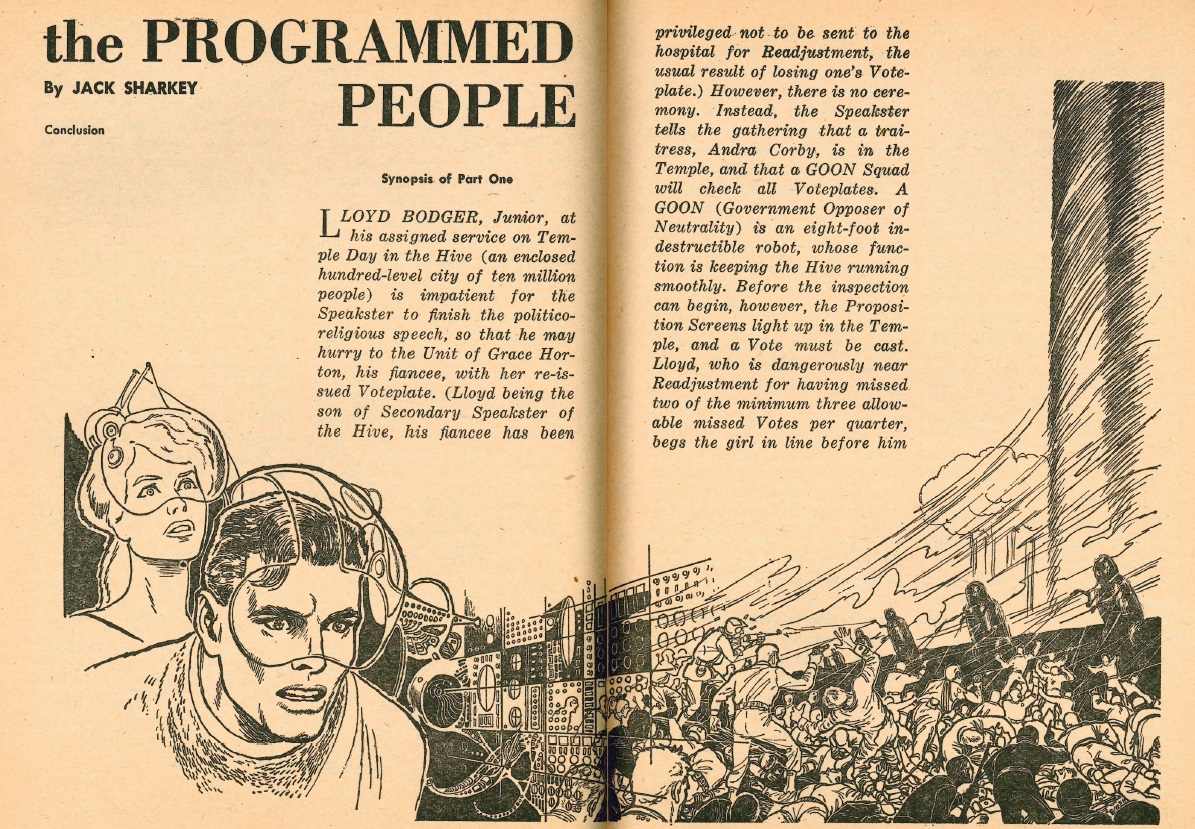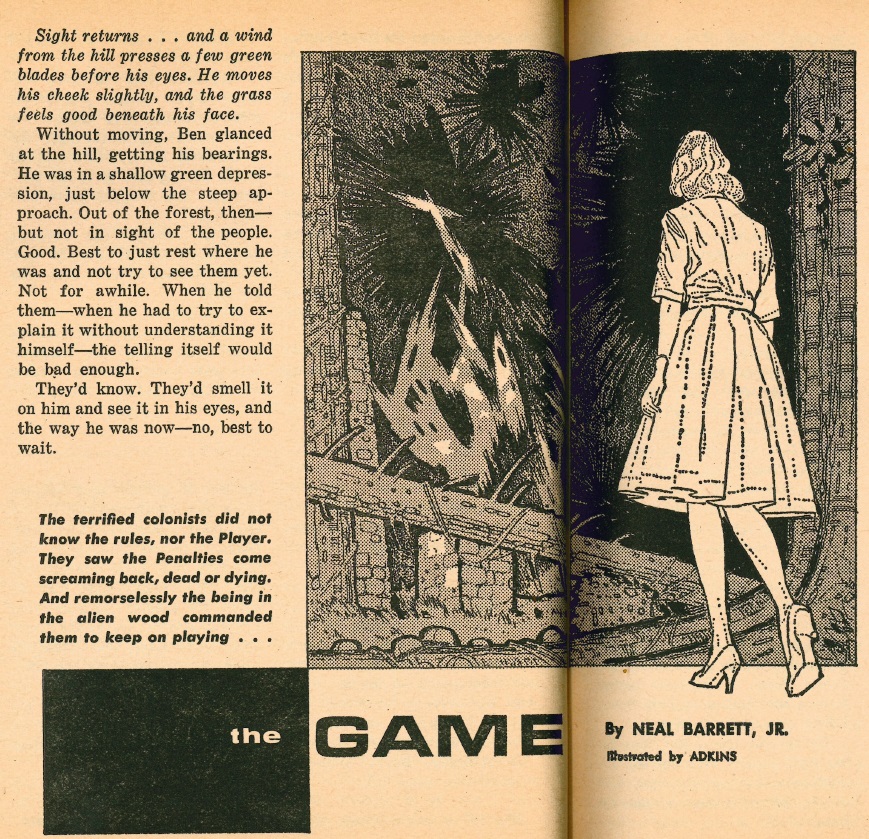
by John Boston

Jack Sharkey’s serialized novella The Programmed People, which concludes in this July 1963 Amazing, describes a tight arc from mediocre to appalling and lands with a thud. It opens with our hero Lloyd queuing up with everybody else in the Hive in front of the Proposition Screens in order to Vote before the Count. Yes, it’s another stilted dystopia (a small isolated world run by a big computer, the Brain) in which all the horrors get capital letters. Also, Voting is mandatory, and there isn’t enough time for everyone to Vote, and Lloyd can’t afford to miss the cut-off because he’s already missed two Votes this quarter out of an allowable Three, excuse me, three. On the next page, Sharkey has apparently lost count; now he says Lloyd will have to be hospitalized for Readjustment if he misses this Vote. Lloyd gets the young woman in front of him to let him jump the line, only to discover that she is the pariah they’ve been warned against who has refused to submit to Hospitalization. He pities her and lends her his girlfriend’s Voteplate (don’t ask) so she can get out of the Temple unrecognized, and then hides her in his room. She tells him that Hospitalization is a ruse for disposal of anyone who is sick or injured, in order to keep the population steady.

There are a lot more busy plot mechanics not worth recounting; it’s reminiscent of a TV sitcom, and the characters act and talk like sitcom characters too. Sharkey has clearly not thought through just what it would be like to live in a state of constant surveillance, fear, and enforced ignorance. At the end of Part I Lloyd has gone to the Brain that controls everything and asked it “Why is the Hive?” Part II has the answer, in a flashback that starts with the 1972 presidential election and goes on for 19 pages, covering more than 50 years of political history, becoming more absurd as it goes on. Then there’s another 15 pages of silly melodrama and thankfully we’re done. One star is too much.

Onward, with trepidation, to the rest of the issue. The cover story is Robert F. Young’s long novelet Redemption, in which space freighter pilot Drake, en route to Mars, is alone on his ship when there’s a knock on the door. It’s a girl! She’s wearing the uniform of the Army of the Church of the Emancipation, but even so, she is, as the author puts it, stacked. Also, she’s named Annabelle Leigh, an allusion the author does nothing with. She has stowed away and wants him to drop her off at the planet Iago Iago in time for the expected resurrection of a saint. He declines and locks her in a storeroom, then his ship runs into a Lambda-Xi field (say what?), which destroys the part of the ship with her in it, and renders the rest of it, and him and his cargo, translucent. When he gets to Mars, he makes inquiries and learns that Annabelle was a saint.
He then sets off on a quest both to sell his damaged cargo and to trace her history, hoping to find evidence that she wasn’t so saintly all the time and thereby make himself feel less guilty about accidentally killing her. He does, sort of, and also learns that this Lambda-Xi field was even more puissant than he realized, capable of generating any contrivance the author needs, including time travel, two varieties of it, the sum of which, overlaid with Young’s characteristic sentimentality, ends up like something A.E. van Vogt might have written for a Hallmark Cards promotion (or maybe vice versa). There are also further strong hints that Young has a few screws loose on the subjects of women and sex—not surprisingly in light of such previous efforts as Santa Clause and Storm over Sodom in F&SF. Maybe somebody else can find something to appreciate here, but it leaves me cold, and annoyed as usual with this all too prolific author. The cover blurb says “A Story You Will Never Forget!” I hope it’s wrong. One star.

After such Redemption, what redemption? Some, at least. Neal Barrett, Jr.’s shorter novelet The Game—his fifth appearance in the SF magazines—is a somewhat crude but grimly effective horror story of Earth colonists who encounter an incomprehensible alien entity that just wants to play a game, with devastating consequences for the humans. It’s refreshingly straightforward after the metaphysically baroque Young story. Four stars.

Now, the crumbs at the bottom of the box. Ron Goulart’s The Yes Men of Venus is a parody of a certain famous pulpster, heavily disguised here as Arthur Wright Beemis, which seems both pitch-perfect and, therefore, almost superfluous. But it’s short enough to be amusing. Three stars for trivia well executed.

Arthur Porges’s The Formula is another contrived and arid gimmick story, involving a highly artificial psi experiment undertaken on a bet. The story turns on appreciating some specialized information that is disclosed in passing about the surroundings. It’s like a grossly expanded version of a filler item in a science magazine. Two stars, generously.

Well, that was depressing. The Barrett story is the sole bright spot in this mostly abysmal issue—and not bright enough by half to redeem (excuse the expression) the disaster of the two lead stories.

You're right. It is depressing. But the Sharkey was so bad (the second instalment was even worse than the first) maybe nothing could have saved the issue. I also thought the Barrett was good – visceral and unsettling. But not good enough to justify the cover price.
The Sharkey was just utterly awful. On top of everything else, the break was very poorly chosen. For at least the first third of the flashback, I thought there had been a printing error. It seemed to have no relation to the story from last month. Sharkey also doesn't seem to have any clear idea about how much time has passed. The first part made it seem people had been in the city for generations, but according to the flashback it had only been a few decades. I don't know what Mr. Sharkey's day-job is, but perhaps he ought to focus on that.
I'm going to have to disagree with you a lot on "Redemption". I found it compelling and the language beautiful (for the most part). It probably won't be the classic that Miss Goldsmith predicts, but it was very good. Indeed, my biggest quibble was that, when confronted with a fabric that is little more than a translucent color, fashion designers would most likely get into vicious and lethal knife fights over the stuff, rather than reject it out of hand as useless.
The Barrett was all right, but I don't think I'd give it more than 3 stars. It was certainly grim, but the ending was almost predictable.
I like Ron Goulart. His sense of humor generally tickles my funny bone. Alas, this parody fell utterly flat. A little too over the top perhaps, or simply carried on too long.
The Porges felt like an Asimov story from 15 or 20 years ago. Dr. A. would have told it with a lot more panache, though.
I have very mixed feelings about "Redemption." It's got emotional appeal, to be sure. Yet it almost reads like a parody of Young's fiction. There's the time paradox, the seemingly doomed romance, the female character who is an archetype instead of a real human being. All in all, this reminded me of a weaker version of Young's story "The Star Fisherman," which I liked quite a lot.
"The Formula" is a one idea story, and I figured out the gimmick from the first clue.
"The Game" was powerful, if a little overwritten, but the ending made nonsense of everything that came before it.
"The Yes Men of Venus" reads like something from a fanzine. OK if you're in search of a sophomoric parody.
I reviewed the Ace Double version of Sharkey's novel, retitled ULTIMATUM IN 2050 A.D. (http://rrhorton.blogspot.com/2015/12/ace-doubles-our-man-in-space-by-bruce-w.html).
I came to pretty much the same conclusion you did.